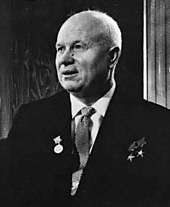|
We will bury you
 "We will bury you" (Russian: «Мы вас похороним!», romanized: "My vas pokhoronim!") is a phrase that was used by Soviet First (formerly General) Secretary Nikita Khrushchev, leader of the USSR, while addressing Western ambassadors at a reception at the Polish embassy in Moscow on November 18, 1956.[1][2] The phrase was originally translated into English by Khrushchev's personal interpreter Viktor Sukhodrev.[3] The phrase was received very negatively by contemporary Western audiences, but some modern translators have suggested the phrase was misinterpreted or mistranslated. HistoryWhile addressing the Western states at the embassy on November 18, 1956, in the presence of communist Polish politician Władysław Gomułka (with Poland being a Soviet-influenced satellite state at the time), Nikita Khrushchev said:
The speech prompted the envoys from twelve NATO nations and Israel to leave the room.[4][5][6] During Khrushchev's visit to the United States in 1959, the Los Angeles mayor Norris Poulson in his address to Khrushchev stated
Many Americans meanwhile interpreted Khrushchev's quote as a nuclear threat.[8] In another public speech Khrushchev declared: "We must take a shovel and dig a deep grave, and bury colonialism as deep as we can".[9] In a 1961 speech at the Institute of Marxism–Leninism in Moscow, Khrushchev said that "peaceful coexistence" for the Soviet Union means "intense, economic, political and ideological struggle between the proletariat and the aggressive forces of imperialism in the world arena".[10] Later, on August 24, 1963, Khrushchev remarked in his speech in Yugoslavia, "I once said, 'We will bury you,' and I got into trouble with it. Of course we will not bury you with a shovel. Your own working class will bury you",[11] a reference to the Marxist saying, "The proletariat is the undertaker of capitalism" (in the Russian translation of Marx, the word "undertaker" is translated as a "grave digger", Russian: могильщик), based on the concluding statement in Chapter 1 of the Communist Manifesto: "What the bourgeoisie therefore produces, above all, are its own grave-diggers. Its fall and the victory of the proletariat are equally inevitable". In his memoirs, Khrushchev stated that "enemy propaganda picked up the slogan and blew it all out of proportion".[12] Khrushchev was known for his emotional public image. His daughter admitted that:
Alternative translationsMany authors have pointed out that "we will bury you" was misinterpreted as a threat of military violence by the USSR against the USA and other capitalist countries, whereas it basically meant that the communist system would outlast and replace capitalism,[10] as predicted by classical Marxist doctrine, and hence "we will bury you" essentially meant "we will survive you" or "we (communists) will live to see you (capitalists) buried".[13] Therefore, alternative translations have been suggested to convey this meaning more accurately. A frequently proposed variant is "We shall be present at your funeral".[14][15][16][17] In the metaphor used by Khrushchev, Russia's role was to take care of the funeral arrangements for capitalism after its demise.[13] It has, additionally, been claimed that the overhead hand clasp gesture reportedly used by Khrushchev in conjunction with the phrase contributed to the misinterpretation due to cultural differences.[13] Mikhail Gorbachev suggested in his book Perestroika and New Thinking for Our Country and the World that the image used by Khrushchev was inspired by the acute discussions among Soviet agrarian scientists in the 1930s, nicknamed "who will bury whom", the bitterness of which can only be understood by the prevalence of Soviet pseudo-scientific Lysenkoist theory at the time.[18] In popular culture
See alsoReferences
External links
|